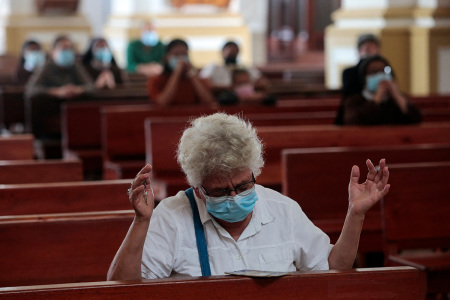Nicaragua releases 12 Catholic priests, exiles them to Rome

Nicaragua has released 12 Catholic priests and sent them to Rome following negotiations with the Vatican. The clergy had been held as political prisoners in a country that persecutes all who are deemed critical of the current regime.
The Nicaraguan government announced Wednesday that the priests were released after “productive talks” with the Vatican and flown to Rome, The Associated Press reported, quoting President Daniel Ortega’s government as saying that the move displayed “the permanent will and commitment to find solutions.”
Matteo Bruni, the director of the press office for the Holy See, noted they would be accommodated in facilities belonging to the Diocese of Rome in Italy, according to Vatican News.
Cardinal Leopoldo Brenes, a high-ranking church official in Nicaragua, has not yet commented on the development, the newswire noted.
Six of the released priests were detained this month. The Organization of American States’ Human Rights Council condemned their arrest and called for the release of all political prisoners in Nicaragua.
According to the U.K.-based rights group Christian Solidarity Worldwide, the remaining priests had been in custody for longer periods.
CSW’s Head of Advocacy, Anna Lee Stangl, said the priests’ release should not be seen as a goodwill gesture by the Nicaraguan government.
Stangl urged the international community to hold Ortega and his regime accountable for stifling independent voices. She emphasized that the priests were faced with an unjust choice of prison or exile, and their citizenship was revoked in exchange for their freedom.
Bishop Rolando Álvarez, who was sentenced to 26 years in prison in February, was not among those released, CSW said.
The Bishop of Matagalpa, Álvarez had previously turned down an opportunity to be among 222 prisoners sent to the U.S. in a deal arranged by the U.S. government. After refusing, Álvarez had his Nicaraguan citizenship revoked by the government.
He remains imprisoned in the La Modelo Tititapa Prison.
In August 2022, Álvarez was put under house arrest and stripped of his Nicaraguan nationality and civil rights for life in February 2022.
An ideology in Nicaragua portrays Ortega as being “anointed by God … for sacred Nicaragua.”
A trend of persecution started in Nicaragua after protests against reforms to the public pension system in April 2018. The protests came after about a decade of deteriorating economic conditions in the country. Protesters, mostly students, demanded democratic reforms and that Ortega and his wife, Vice President Rosario Murillo, step down as they established a dictatorship marked by nepotism and repression.
During the initial days of the 2018 protests, Ortega requested that the Catholic Church act as a mediator. But his administration also began using brutal force against protesters and later on, Catholic clergy.
Catholic clergy aided and provided sanctuary to protesters and voiced support for the right to protest peacefully. But as a result, Ortega used his government and supporters to persecute clergy, worshipers and various Catholic organizations.
Hundreds of people died in the protests in 2018.





















